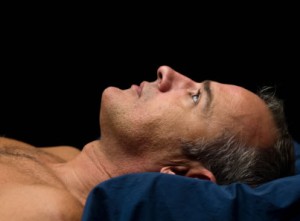Published: January 19, 2012

istockphoto
ew research from
Uppsala University shows that a specific brain region that contributes to a person’s appetite sensation is more activated in response to food images after one night of sleep loss than after one night of normal sleep. Poor sleep habits can therefore affect people’s risk of becoming overweight in the long run. The findings are published in
The Journal of Clinical Endocrinology & Metabolism.
Researchers Christian Benedict and Helgi Schiöth, of the Department of Neuroscience at Uppsala University, showed in an earlier article, published in American Journal of Clinical Nutrition, that a single night of total sleep loss in young normal weight men curbed the energy expenditure the next morning. This research also showed that subjects had increased levels of hunger, which indicates that an acute lack of sleep may affect human’s food perception.
In a new study, Christian Benedict, together with Samantha Brooks, Helgi Schiöth and Elna-Marie Larsson from Uppsala University and researchers from other European universities, have now systematically examined which regions in the brain, involved in appetite sensation, are influenced by acute sleep loss. By means of magnetic imaging (fMRI) the researchers studied the brains of 12 normal-weight males while they viewed images of foods. The researchers compared the results after a night with normal sleep with those obtained after one night without sleep.
Christian Benedict explains:
“After a night of total sleep loss, these males showed a high level of activation in an area of the brain that is involved in a desire to eat. Bearing in mind that insufficient sleep is a growing problem in modern society, our results may explain why poor sleep habits can affect people’s risk to gain weight in the long run. It may therefore be important to sleep about eight hours every night to maintain a stable and healthy body weight.”
Source: Uppsala Universitet
Published: December 6, 2011
 Older women with weaker circadian rhythms, who are less physically active or are more active later in the day are more likely to develop dementia or mild cognitive impairment than women who have a more robust circadian rhythm or are more physically active earlier in the day. That’s the finding of a new study in the latest issue of the Annals of Neurology.
Older women with weaker circadian rhythms, who are less physically active or are more active later in the day are more likely to develop dementia or mild cognitive impairment than women who have a more robust circadian rhythm or are more physically active earlier in the day. That’s the finding of a new study in the latest issue of the Annals of Neurology.
“We’ve known for some time that circadian rhythms, what people often refer to as the “body clock”, can have an impact on our brain and our ability to function normally,” says Greg Tranah, PhD., a scientist at the California Pacific Medical Center Research Institute – part of the Sutter Health network – and the lead author of the study. “What our findings suggest is that future interventions such as increased physical activity or using light exposure interventions to influence circadian rhythms, could help influence cognitive outcomes in older women.”
The researchers collected data on activity and circadian rhythm from 1,282 healthy women, all over the age of 75, who were taking part in the Study of Osteoporotic Fractures. All the women underwent a series of neuropsychological tests to ensure they had no evidence of cognitive or brain problems. At the end of five years 15 percent of the women had developed dementia and 24 percent had some form of mild cognitive impairment (MCI). Those women who had weaker circadian rhythm activity, lower levels of activity, or whose peak level of activity was later in the day, were at highest risk of developing dementia or MCI. [continue reading…]
Published: October 26, 2011
 How can a good night’s sleep improve your memory? Why does the answer to a crossword clue suddenly appear first thing in the morning after a night’s rest? In this week’s All in the Mind Claudia Hammond talks to psychologist, Kimberly Fenn about what happens in the brain when we sleep and why it can significantly improve our memory. Hysteria or conversion disorder is surprisingly, not confined to medical history. Nearly 1 in 5 patients seen by neurologists will have symptoms like paralysis, fits or loss of vision which can’t be explained neurologically. Claudia talks to neurologist, Mark Edwards and psychiatrist, Richard Kanaan about the history of conversion disorder, how common it is today, the best way to treat it and its complex causes. Also in the programme, Claudia meets the carers getting involved in mental health research and why their input is making a a difference to research projects exploring mental health across the country.
How can a good night’s sleep improve your memory? Why does the answer to a crossword clue suddenly appear first thing in the morning after a night’s rest? In this week’s All in the Mind Claudia Hammond talks to psychologist, Kimberly Fenn about what happens in the brain when we sleep and why it can significantly improve our memory. Hysteria or conversion disorder is surprisingly, not confined to medical history. Nearly 1 in 5 patients seen by neurologists will have symptoms like paralysis, fits or loss of vision which can’t be explained neurologically. Claudia talks to neurologist, Mark Edwards and psychiatrist, Richard Kanaan about the history of conversion disorder, how common it is today, the best way to treat it and its complex causes. Also in the programme, Claudia meets the carers getting involved in mental health research and why their input is making a a difference to research projects exploring mental health across the country.
 Listen now
Listen now
Published: January 12, 2011
According to a recent study accepted for publication in The Endocrine Society’s Journal of Clinical Endocrinology & Metabolism (JCEM), exposure to electrical light between dusk and bedtime strongly suppresses melatonin levels and may impact physiologic processes regulated by melatonin signaling, such as sleepiness, thermoregulation, blood pressure and glucose homeostasis. [continue reading…]


